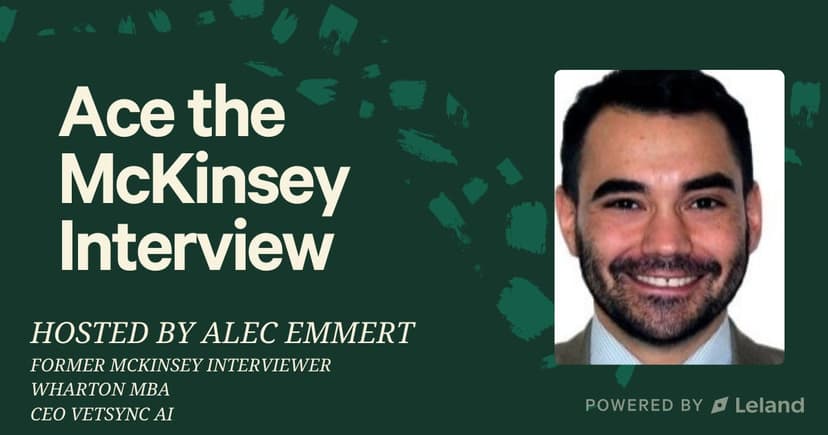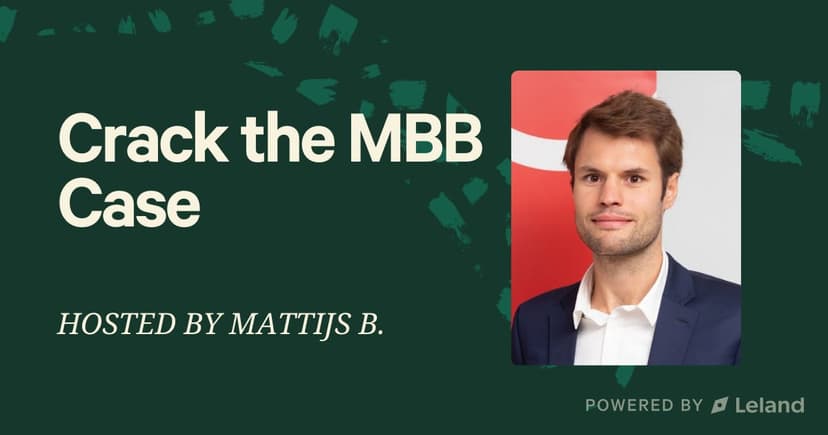How to Answer the "Why Consulting" Interview Question
Discover top strategies for answering the "Why Consulting" interview question. Learn how to highlight your passion and fit for the consulting role.
Posted June 13, 2025

Join a free event
Learn from top coaches and industry experts in live, interactive sessions you can join for free.
Table of Contents
Navigating a career in management consulting can be both a rewarding journey and a daunting challenge. Many people are drawn to consulting for the challenge of solving complex problems, the variety of projects, and the fast learning pace. However, giving a well-thought answer involves more than just mentioning the dynamic work or future opportunities. You need to explore both personal and professional reasons for 'why consulting'.
This article will help you effectively answer the 'why consulting' interview question. Whether you're excited about developing key skills or making an impact in a consulting firm, it's important to know how to explain your motivations.
We will explore the significance of this question from the perspectives of both the interviewee and the consulting firms, identify common reasons behind the choice to pursue a career in consulting, and provide strategies for crafting answers that resonate on a personal level. With that being said, let’s begin!
Why Is the “Why Consulting” Question Important?
The importance of the “Why Consulting?” question in management consulting interviews cannot be overstated. Consulting firms use this question as a test to gauge a candidate's motivation and understanding of the consulting role. It's not only about why one chooses consulting over other careers, but specifically why they prefer top consulting firms like McKinsey, BCG, or Bain. This question typically surfaces during the fit interview, also known as the Experience Interview or Personal Experience Interview at McKinsey.
“Why Consulting?” often serves as the opening query in an interview, setting the tone for the rest of the conversation. Interviewers form initial impressions quickly, often within the first 10 to 15 minutes, making a compelling and thoughtful response to the "Why Consulting?" question a critical element of the interview. Given its frequency and significance, candidates are advised to invest time in crafting a persuasive and personalized answer. Surprisingly, while many candidates typically prepare extensively for case interviews, they often overlook the importance of this particular question.
Consulting firms also use this question to assess how well candidates have researched the specific firm and whether they have engaged with recruiters, attended events, or spoken with current firm members. This engagement shows a candidate's dedication and interest in the firm, which can significantly influence the interview outcome.
Common Reasons for Choosing Consulting
Management consulting offers a dynamic and intellectually stimulating career path that attracts many professionals. This section explores common reasons individuals choose consulting, from the diversity of industries and functions they can explore, to the significant problems they solve, and the high-level executive interactions they experience.
It Explores Different Industries and Functions
Management consultants often have the opportunity to work across a wide range of industries, gaining insights into various business operations and strategies. This exposure is invaluable, allowing the management consultants to develop a broad skill set that is highly adaptable and applicable to numerous sectors. Whether it's working with tech giants or small local businesses, the experience enhances a consultant's ability to understand and navigate different corporate landscapes.
It Solves Big Problems
One of the most compelling aspects of consulting is the opportunity to tackle substantial and complex business challenges. Consultants are brought in to solve problems that are too large or too complex for clients to handle internally. This involves breaking down large issues into manageable parts, offering solutions, and implementing them effectively. The satisfaction derived from resolving these significant challenges is a powerful motivator for many in the field.
It Works with High-level Executives
Interacting with senior executives and having a tangible impact on their decision-making processes is another significant draw of consulting work. Consultants often work closely with C-level executives, providing them with critical insights that influence major business decisions. This access to top-level management not only allows consultants to make a substantial impact but also accelerates their understanding of high-stakes business environments.
Financial Benefits and Exit Opportunities
Consulting is known for its lucrative compensation packages and the promising exit opportunities it offers. Professionals in this field are well-compensated, and the skills they acquire make them highly sought after for senior roles in various industries. Additionally, the exit options available to consultants are diverse, ranging from corporate management to entrepreneurship, offering multiple pathways to career advancement and personal fulfillment.
Read: Journey of a Management Consultant: Roles, Responsibilities, and Rewards and Consulting Coffee Chat Questions: How to Make the Most of Your Coffee Chat
How to Craft a Structured and Personal Answer
Provide a Summary of the Main Reasons You Want to Work in Consulting
When crafting a response to the "Why consulting?" question, it is essential to start with a clear and direct statement that encapsulates your primary motivations for choosing this career path.
For instance, one might begin by saying, “Consulting is my top career choice because it can develop my knowledge and expertise in a particular industry or function.”
Following this, detailing three specific reasons that are personally important enhances the clarity and impact of your answer. These reasons should reflect a deep understanding of the consulting role and demonstrate that the choice is a well-considered decision.
Read: A Day in the Life of a McKinsey Management Consultant
Be Thorough in Your Answers
Your response should not only list reasons but also connect these reasons with your personal experiences and qualifications. This involves demonstrating how your background, skills, and ambitions align with the demands of a consulting career. For example, you might discuss past experiences where you solved complex problems or led a team under challenging circumstances, illustrating your capability and readiness for the consulting environment. It's crucial to avoid superficial statements and instead provide examples that substantiate your claims, making your answer both credible and compelling.
Personalize Your Answers to the Firm You’re Interviewing With
Understanding the specific consulting firm and tailoring your answer to reflect this knowledge can significantly enhance your response. This means mentioning particular aspects of the firm that attract you, such as its culture, focus areas, or leadership in the industry. Discussing how these elements align with your career goals shows that you have done your homework and are genuinely interested in what the firm stands for. This personalized approach helps differentiate your answer from generic responses and demonstrates a thoughtful engagement with the firm.
Demonstrate Your Passion About Consulting
Expressing genuine enthusiasm for consulting is crucial. This can be achieved by highlighting the aspects of consulting that excite you the most, such as the opportunity to work on influential projects, interact with top business leaders, or contribute to impactful business solutions. Your passion should be evident through the energy and sincerity of your delivery, making it clear that consulting is more than just a career choice — it's a field you are eager to contribute to and grow within. Practicing your response to convey enthusiasm effectively can make a significant difference in how your answer is perceived.
In crafting your answer to the 'why consulting' interview question, it's also important to rehearse delivering your reasons with confidence and authenticity. Practicing how you articulate your motivations can significantly enhance the delivery, making your answer not only structured but also engaging and convincing.
“Why Consulting?” Question Examples
When preparing for consulting interviews, you should anticipate variations of the "Why consulting?" question tailored to different contexts and firms. Make sure to provide a good answer to each question during your consulting interview. Take a look at some of the examples below that illustrate how this question might be framed:
1. What motivates you to pursue a career in consulting?
Sample answer:
I am motivated to pursue a career in consulting because it offers a unique opportunity to tackle diverse challenges across various industries. I thrive in dynamic environments where problem-solving and strategic thinking are essential. Consulting allows me to constantly learn and grow by working with different clients and projects. I am also passionate about making a tangible impact on businesses, helping them achieve their goals, and driving meaningful change. I see consulting as a way to build a strong toolkit – both on hard skills and soft skills – to become a business executive.
2. How do you think consulting will help you achieve your long-term career goals?
Sample answer:
Consulting will help me achieve my long-term career goals by providing a solid foundation of skills and experiences that are highly transferable across various industries. The exposure to a wide range of business problems and solutions will enhance my strategic thinking and analytical abilities.
Consulting will also help me build a diverse skill set, including project management, client relationship management, and effective communication, which are crucial for leadership roles in the future. I am confident that consulting will equip me with the knowledge and expertise needed to excel in my desired career path.
3. What aspects of consulting do you find most appealing, and why?
Sample answer:
What I find most appealing are the variety of projects, the intellectual challenges, and the opportunity for continuous learning. The variety of projects ensures that no two days are the same, keeping the work engaging and stimulating. I am drawn to the intellectual challenges that come with solving complex business problems and developing innovative solutions.
Consulting provides a platform where I can apply my analytical skills and think critically about different industries and business functions. Consulting firms invest in their employees' growth through training programs, mentorship, and exposure to diverse experiences, which aligns with my commitment to lifelong learning and self-improvement.
4. Can you provide an example of a time when you solved a complex problem, and how does that experience relate to consulting?
Sample answer:
In my previous role, I was part of a team tasked with improving the efficiency of our company's supply chain operations. We were facing significant delays and high costs due to inefficiencies in our processes. I led a cross-functional team to analyze the current workflow, identify bottlenecks, and develop a comprehensive strategy to streamline operations. We implemented a new inventory management system, optimized our logistics network, and introduced data-driven decision-making processes. As a result, we reduced lead times by 20% and lowered operational costs by 15%.
This experience relates to consulting as it requires problem-solving, strategic thinking, and collaboration with different stakeholders. It demonstrated my ability to analyze complex issues, develop actionable solutions, and drive meaningful results, which are essential skills in consulting.
5. Why do you believe you are a good fit for the consulting industry?
Sample answer:
I believe I am a good fit for the consulting industry because of my strong analytical skills, ability to work well under pressure, and passion for continuous learning. My academic background in business and my professional experiences have equipped me with a solid foundation in data analysis, problem-solving, and strategic thinking.
I thrive in fast-paced environments and have a proven track record of delivering high-quality results within tight deadlines. I am highly adaptable and enjoy tackling new challenges, which aligns with the dynamic and ever-evolving nature of consulting. Also, my commitment to professional development and eagerness to learn from diverse experiences will enable me to excel in the consulting field and contribute effectively to client projects.
Each of these examples articulates a clear, concise, and compelling response that reflects your understanding of the consulting industry, your personal and professional motivations, and your potential fit within the consulting job you are applying to. Preparing tailored answers to these variations can significantly enhance a candidate's presentation and impact during the consulting interview process.
Read: How to Succeed in a Consulting Career - An Expert Coach's Guide
What are the Common Mistakes to Avoid?
Generic Responses
If you want to join consulting, one of the things you must avoid is giving generic answers. An error among candidates is providing generic responses to the "Why consulting?" question. Many fall into the trap of listing common reasons such as the desire for a steep learning curve, exposure to a variety of problems, and interactions with C-level executives. However, these reasons, while valid, are often shared by a majority of candidates and fail to distinguish one from the competitive pool. It is crucial to avoid crafting an answer that makes you appear as a candidate who sees consulting merely as a default career choice, lacking genuine interest and understanding of the consulting field.
Overemphasizing Financial Gains
Another significant misstep is overemphasizing the financial benefits of consulting. While consulting is known for its lucrative compensation, focusing primarily on this aspect can be detrimental. It might signal to interviewers that the candidate's motivation is skewed towards financial gains rather than a passion for the consulting role itself or an interest in the specific challenges it offers. This perception could lead interviewers to doubt whether the candidate will stay committed to the firm in the long run or leave once a more financially appealing opportunity arises.
Lack of Specific Examples
Candidates often fail to substantiate their reasons for choosing consulting with specific, personal examples. It is not enough to simply state that one is attracted to the problem-solving nature of consulting; candidates need to demonstrate this through examples from their past experiences where they have effectively solved complex problems or have been involved in significant business decisions. Lack of such examples can make an answer feel shallow and unsupported, suggesting that the candidate might not have the depth of experience or the analytical skills required for a consulting role.
Need Help with Your Consulting Application?
Throughout this article, we've unraveled the complexities behind crafting a compelling answer to the pivotal question, "Why consulting?" We emphasized the importance of presenting a structured, personalized, and passionate response, grounding it in a clear understanding of the consulting role, its challenges, and the unique opportunities it offers.
Recognizing the broader significance of this discourse, it's clear that answering "Why consulting?" with conviction and clarity not only enhances your candidacy but also reaffirms your commitment to a consulting career. As we conclude, remember that the journey to a successful career in consulting begins with a deep, introspective understanding of your professional aspirations and the value you bring to the consulting world.
Applying to top consulting firms can be a daunting experience, but Leland is here to help and lead you on the right career path. For personalized support and guidance as you prepare for interviews and polished answers, work with one of our world-class, vetted, and industry-specific coaches. Browse our consulting coaches here.
Read these next:
- Top MBA Programs for a Career in Consulting
- Types of Consulting: A Comprehensive Overview
- What is Management Consulting?
- What to Major in for Consulting
FAQs
What are the main reasons to pursue a career in consulting?
- Common reasons include the opportunity to work on diverse projects, continuous learning and development, exposure to various industries, the ability to solve complex problems, and the potential for career advancement.
How do I choose the top reasons for wanting to work in consulting?
- Pick 3-4 reasons that genuinely resonate with you, such as a passion for problem-solving, desire for professional growth, interest in working with different clients, or the dynamic and challenging nature of consulting work.
How can I effectively convey my interest in consulting during an interview?
- Start with a summary of your top reasons for wanting to work in consulting. Be specific and provide examples from your past experiences that highlight your skills and align with the consulting role.
What skills are important for a consulting career?
- Key skills for consulting include analytical thinking, problem-solving, communication, teamwork, adaptability, and strong work ethic. Highlight these skills when explaining why you want to work in consulting.
How can I demonstrate my fit for a consulting role?
- Show how your background, skills, and experiences align with the demands of consulting. Use specific examples to illustrate your problem-solving abilities, teamwork, and adaptability.
Why is it important to have clear reasons for wanting to work in consulting?
- Clear reasons show your genuine interest and commitment to the field. They help interviewers understand your motivations and assess whether you are a good fit for their firm.
Can my background in a different industry be relevant for a consulting career?
- Yes, diverse backgrounds can be valuable in consulting. Emphasize transferable skills such as problem-solving, analytical thinking, and project management that are applicable to consulting.
How do consulting firms evaluate candidates' answers to "Why Consulting?"
- Firms look for well-articulated, genuine reasons that show a clear understanding of the consulting industry. They assess your motivations, alignment with the firm's values, and your potential to succeed in a consulting role.
Browse hundreds of expert coaches
Leland coaches have helped thousands of people achieve their goals. A dedicated mentor can make all the difference.


























